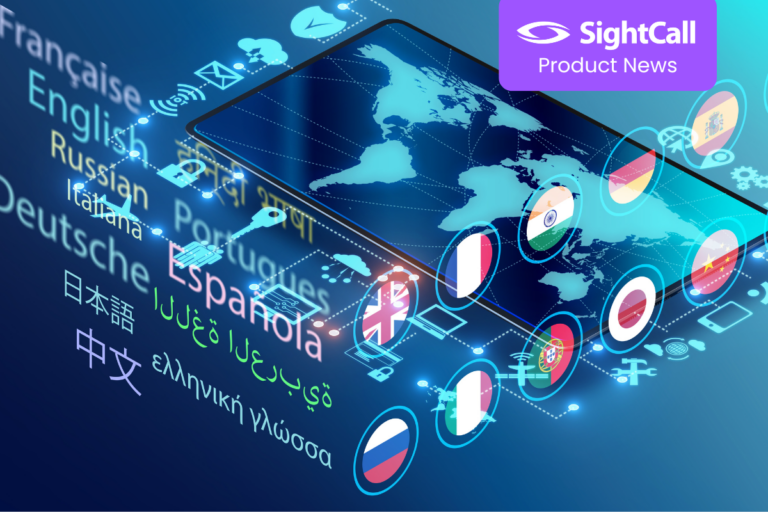Unlocking Multilingual Collaboration with SightCall
In today’s global service landscape, language barriers frequently hinder effective communication, complicating problem-solving and negatively impacting customer satisfaction. Organizations across field service, insurance, customer service, and healthcare increasingly operate in multilingual environments, yet often lack the tools to seamlessly bridge language gaps during live support sessions.
SightCall addresses this challenge with its new Real-Time Voice-To-Text Translations feature, an advanced capability within the SightCall Remote Visual Support. This feature instantly converts spoken communication into text during remote sessions, providing accurate translations in over 100 languages, enabling fluid collaboration across language barriers and significantly enhancing the customer and employee experience.
According to 2023 research by Common Sense Advisory, “76% of global customers prefer purchasing products and services in their native language.”
This demonstrates a clear market need for robust multilingual capabilities that empower global customer interactions and service delivery.
SightCall’s Real-Time Voice-To-Text Translations capability directly addresses this imperative, ensuring multilingual support teams and customers communicate clearly, efficiently, and effectively, regardless of their native language.
How SightCall Real-Time Translations Works
SightCall’s Real-Time Voice-To-Text Translations leverages cutting-edge speech recognition and translation technologies, instantly converting spoken dialogue into text across multiple languages. Activated during remote visual support sessions, this feature provides live multilingual translation streams directly within the SightCall interface for remote support console agent and guest.
This capability ensures clear, immediate understanding between agents and guest like remote experts with onsite technicians, level 1 support agents with customers, remote claims adjusters with policyholders, and healthcare providers with patients—regardless of their language preferences.
Industry-Specific Use Cases
Field Service Operations
Technicians onsite in manufacturing plants or remote facilities worldwide can seamlessly collaborate with remote experts, clearly understanding complex instructions in their preferred language to minimize downtime, costly errors, meantime to repair.
Remote Experts: Communicate technical instructions clearly to onsite technicians and customers, no matter their native language, reducing miscommunication.
Field Technicians: Receive precise, translated guidance instantly, significantly accelerating troubleshooting, and improving first-time fix rates.
Onsite Customers: Benefit from clear understanding and guidance, regardless of language, improving customer satisfaction and minimizing frustration.
Remote Insurance Claims
Claims adjusters efficiently process claims in multilingual regions, accurately capturing policyholder details and resolving claims faster due to clear, immediate multilingual communication.
Remote Claims Adjusters: Clearly and accurately communicate with policyholders in any language, streamlining the claims process and minimizing misunderstandings.
Policyholders: Clearly express claim details and fully understand adjuster instructions, reducing claim resolution times and enhancing customer satisfactio
Customer Service Teams
Global customer service organizations resolve customer inquiries rapidly and accurately, providing exceptional customer support experiences regardless of linguistic diversity
- Customer Service Agents: Handle multilingual customer interactions smoothly, delivering effective support without delays or misunderstandings caused by language barriers.
Customers: Receive personalized, timely assistance in their preferred language, resulting in significantly improved service experiences.
Telehealth Providers
Healthcare professionals safely and accurately deliver medical guidance to patients from diverse linguistic backgrounds, significantly enhancing patient understanding, adherence, and health outcomes.
Healthcare Providers: Clearly communicate diagnoses, care instructions, and medical details to patients speaking different languages, ensuring patient comprehension and safety.
Patients: Clearly understand health information and guidance from providers, improving patient outcomes and overall satisfaction.
Key Pain Points Addressed by Real-Time Voice-To-Text Translations
Communication Breakdown: Resolves misunderstandings and miscommunications resulting from language barriers.
Operational Inefficiency: Reduces time wasted on translations, streamlining workflow efficiency and collaboration across global teams.
Customer and Patient Frustration: Eliminates confusion and frustration caused by language barriers, resulting in significantly improved satisfaction ratings.
Compliance and Risk: Mitigates compliance risks due to misunderstandings, ensuring precise documentation of interactions across languages.
Proven Value and KPI Improvements
Organizations adopting SightCall’s Real-Time Voice-To-Text Translations can realize measurable benefits, such as:
Increased First-Time Fix Rate: Clear multilingual communication results in precise instruction delivery and fewer repeat visits.
Reduction in Call Duration: Effective multilingual communication reduces unnecessary explanations, callbacks, or miscommunications.
Improved Customer Satisfaction: Providing personalized, multilingual experiences directly boosts customer loyalty and satisfaction scores.
Enhanced Compliance Accuracy: Accurate, real-time multilingual translations ensure detailed, precise interaction records, minimizing compliance risks.
Supporting Multilingual Operational Excellence
SightCall’s Real-Time Voice-To-Text Translations capability not only solves critical communication barriers but also strategically positions organizations to deliver superior global service experiences. It empowers service teams across industries to collaborate confidently, reduces operational inefficiencies, enhances customer experiences, and supports organizational compliance standards in multilingual environments.

